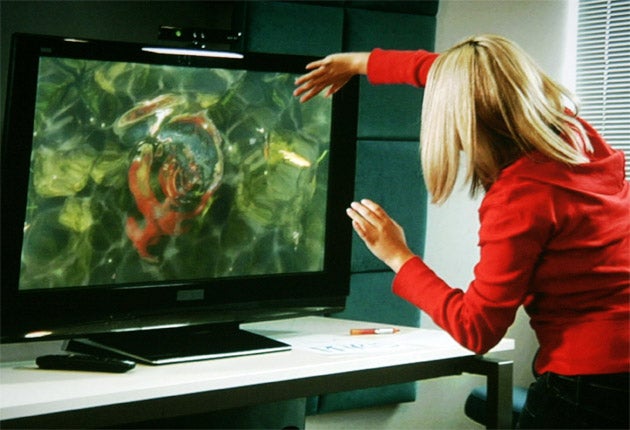Hands off! It's Microsoft's answer to Wii
Spielberg turns up to welcome first hands-free computer game controller

Your support helps us to tell the story
From reproductive rights to climate change to Big Tech, The Independent is on the ground when the story is developing. Whether it's investigating the financials of Elon Musk's pro-Trump PAC or producing our latest documentary, 'The A Word', which shines a light on the American women fighting for reproductive rights, we know how important it is to parse out the facts from the messaging.
At such a critical moment in US history, we need reporters on the ground. Your donation allows us to keep sending journalists to speak to both sides of the story.
The Independent is trusted by Americans across the entire political spectrum. And unlike many other quality news outlets, we choose not to lock Americans out of our reporting and analysis with paywalls. We believe quality journalism should be available to everyone, paid for by those who can afford it.
Your support makes all the difference.The battle for computer game supremacy entered uncharted territory yesterday as Microsoft revealed its answer to the Nintendo Wii – a revolutionary control system for its Xbox 360 console that requires no hand-held device.
Instead, its motion-sensing Project Natal recognises movement and speech in a way that allows players to do without the control pads and joysticks that have been an essential part of computer games for the past two decades.
Natal allows players to score goals by kicking a virtual football and kill targets by firing a virtual gun. The console's designers claim that the technology is so sensitive it can read subtly different facial expressions and recognise different family members, logging them on automatically on personal Xbox 360 profiles.
The system uses a camera, several microphones, a depth sensor and special three-dimensional software to form a map of body movement that constantly updates itself. The microphone software can detect subtle changes in tone and is designed to respond to, and remember, voice commands.
Microsoft is hoping Natal will attract the same "casual" gamers who have made the Wii such a massive hit for Nintendo.
Monday's launch at the E3 (Electronic Entertainment Expo) in Los Angeles was attended by film director Steve Spielberg and featured a line-up of new games. They include Beatles Rock Band, Final Fantasy XIII, Tony Hawk Ride, and Call of Duty: Modern Warfare 2.
Details of the new console were leaked a few weeks ago when the US patent office released documents filed by Microsoft describing a "motion sensor that makes use of face recognition software and biometrics". However, most experts believed the documents were for concepts rather than an actual application.
No official launch date has been set for the new products, but they are expected to go on sale early next year.
Microsoft also announced that users of Project Natal will be able to update their personal accounts on Facebook and Twitter, two social networking websites, and listen to the London-based radio service Last.fm. The service enables users to build their own personalised radio stations, containing only music they have chosen.
'It's the one to beat': A gamer's verdict
At first glance, Microsoft's Project Natal motion control feels very strange. With just a camera perched on top of your TV tracking your body in 3D, you get to throw F1 cars around corners using invisible steering wheels, kick imaginary balls goalbound and skate around your lounge without skateboards. But once you get over the initial oddity of it, the simplicity of the gameplay and the sheer fun factor makes it clear that Microsoft have just introduced a game-changer in the gaming world.
The key thing here is that Natal works without a controller and can also digitise your own real-life items to use in-game. Clever stuff, and a clear statement of intent and one-upmanship to Nintendo. The games we've seen on display at the E3 conference in Los Angeles remain basic and a little childish, though the graphics look great and the responsiveness seems to hold up well. But we can't wait to see just how this new technology can go. Dare we dream of actually playing for our team in FIFA 2010?
Wherever it leads, Microsoft has certainly thrown down the gauntlet to the Wii and this looks like the one to beat. At the very least it has given us a tantalising taste of what's in store in the future of gaming.
Kieran Alger is editor of technology and gadget website T3.com
Join our commenting forum
Join thought-provoking conversations, follow other Independent readers and see their replies
Comments